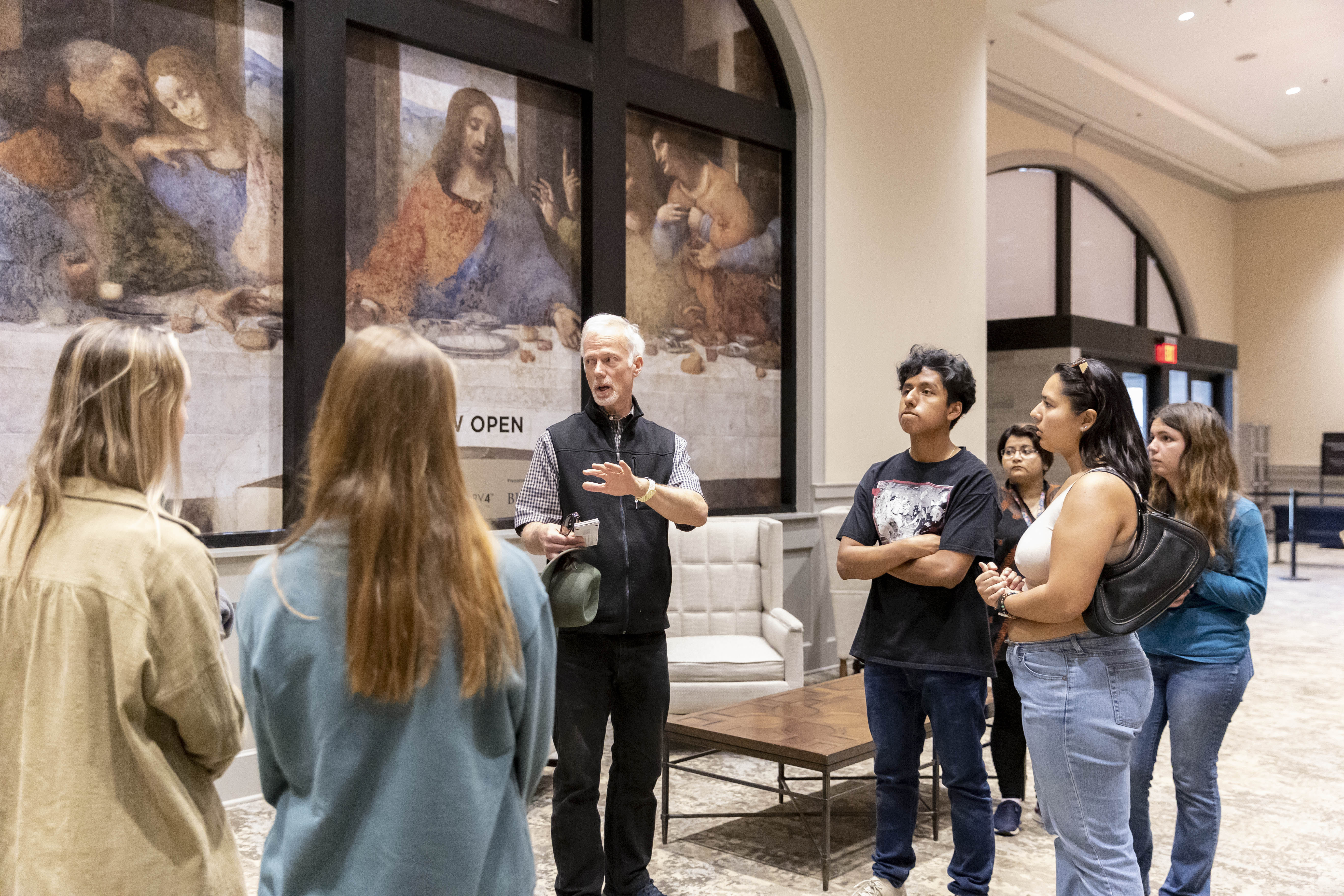Honors Program
As an honors student you will be exposed to ideas of many of the greatest thinkers of all time—artists, social scientists, philosophers, theologians, scientists—in a cross-disciplinary curriculum and given many opportunities to grapple with the central question of what it means to be human. You will attend special lectures and participate in a place-based curriculum focused on opportunities for experiential learning in and beyond the classroom.
You will also have an opportunity to live in honors-designated residence halls and be given unique leadership opportunities on campus. This combination of classroom setting and residence life will enable you to thrive in a mutually supportive environment that’s designed for academically gifted students.
You will receive an honors scholarship, and upon graduation you will discover that the merits of the program have accrued when you’re ready to apply for graduate school or begin your career. The HON course prefixes on your transcript is a clear signal to prospective employers and graduate school admissions officers that you have strong academic ability and self-motivation.
Our Mission
The Lees-McRae College Honors program is dedicated to offering students in-depth experiential learning through a shared cohort of classes that cultivate critical and creative thinking and collaborative learning. The program encourages community and global service through interdisciplinary academically advanced courses, many of which are rooted in our natural environment. The program instills principles of resilience and global stewardship and empowers students with the skills needed to address the world’s most urgent challenges.
What is an Honors Course?
Honors courses tend to be qualitatively, rather than quantitatively, different from classes that do not carry the honors designation. Instead of more papers, tests, and projects, honors students can expect to explore subjects in greater depth. Professors expect better analysis and a higher order of thinking from students enrolled in honors classes, and students may be called upon to collaborate with peers and faculty in classes that carry the honors designation more frequently than in other classes.
Lees-McRae Honors courses are characterized by:
- In-depth learning with a focus on depth rather than breadth and an emphasis on pivotal moments within the discipline
- Use of primary sources and those that are high-quality, relevant, and credible
- Experiential learning and a focus on research
- A presentation or exhibit, especially at the 300 and 400 levels
- Collaborative learning
All three types of honors classes are marked with an HON prefix on students' transcripts.
Honors Status
To remain in the Honors Program, you must maintain a GPA of 3.0. Any honors student who receives an XF in a class will be removed from the Honors Program and his or her honors scholarship will be revoked.
-
Does the honors program choose its classes based on a student's major, or am I going to wind up having to take classes I don't need?
The Honors Program classes are all core classes—classes that everyone needs in order to graduate. While the honors program itself does not cater to any specific major, all classes offered benefit all honors students, regardless of major. -
Besides having more challenging classes, what other activities to honors students typically engage in?
In addition to attending more challenging classes, honors students do have monthly honors meetings to attend. Lees-McRae College invites special guests (such as authors, veterans, and notable figures) to speak for honors students only. The Honors Program also coordinates social functions such as barbeques, dinners, and field trips to help enhance honors students' social and learning atmospheres. -
Should I wait a semester or two to get used to college before I begin the Honors Program?
No. Honors courses are designed to help you make the most of your college experience; you will want to take as many honors courses as soon as possible. We recommend that you stick with the Honors Course Plan to ensure that you complete the Program as early and as efficiently as possible. If you are hesitant to take on the responsibility of the Honors Program but are still interested in being an honors student, please speak to your advisor to see if any changes can be made to help you adjust. -
Are honors classes much harder than regular courses?
You will work hard as an honors student, but within small classrooms and with individualized attention from your professors. You will be learning from your professors, not just memorizing factoids for the next quiz. Honors classes also help complete general education requirements; therefore, they are definitely worth the hard work. -
Will the Honors Program constrain my other academic options?
No. While the Honors Program focuses primarily on your first two years as a student, the faculty goes out of its way to ensure that the plan remains as flexible as possible. The classes are general education classes that all students are required to take before graduation; therefore, you are getting your honors credits while also contributing to your graduation. The Honors Program is here to enhance your college experience, not to dominate it.
Selection for the Honors Program
The Lees-McRae College Honors Program seeks to recruit, educate, and retain exemplary and dedicated students in living-learning communities through innovative seminars, exceptional courses, and travel opportunities that foster personal growth, cultural awareness, and intellectual curiosity.
Students who meet certain levels of academic success at the time of admission to Lees-McRae College will automatically be admitted to the Honors Program. There is no additional application process other than a student’s application for admission.
Each student who is selected to participate in the Honors Program will receive a $2,000 annual Honors Scholarship. This award is in addition to any other merit scholarship that a student qualifies for. Please note that to receive this scholarship, a student must agree to and actively participate in the Honors Program. In addition to a challenging curriculum, there is also an extracurricular component of the program that includes field trips, a speaker series, and other activities/events.
Questions? Please contact Trent Burleson, Director of Admissions, at 828.260.4155, or send an email to burlesont@lmc.edu.
Forms for Current Students
Contact Us
Robert Turpin, PhD
Director of the Honors Program
Abby Arnold-Patti, PhD
Assistant Director of the Honors Program









